This spring, the Department of English is pleased to honor the achievements of our Graduating Class of 2023. The seniors below were each nominated by individual faculty members of the Department of English for this public recognition. Click on a profile below to learn more about these students’ time as English and Film Studies majors at MSU, their inspirations, passion projects, and future plans. They also have advice for their peers, and reflect on graduating during this unprecedented semester in MSU’s history.
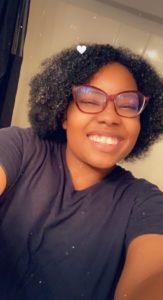 Faculty Shout-out by Dr. Robin Silbergleid:
Faculty Shout-out by Dr. Robin Silbergleid:
“I have had the pleasure of working with SaMya in the context of two advanced creative writing courses, Advanced Poetry (Spring 2022) and her senior capstone in creative writing (Spring 2023). SaMya’s creative work in both of those courses has been devoted to crafting pieces that center and uplift Black female characters and experiences. In her poetry chapbook “Black Compliance,” she offered a multi-faceted look at Black womanhood and empowerment through the lens of hair care and style. Her senior capstone project, a young adult dystopian novel, moves outward from personal experience and family relationships to meditate on systemic racism and violence perpetrated against Black people, as well as the crisis of the COVID-19 pandemic, through a fictionalized “contagion” used as population control. As a writer, SaMya excels at characterization and world building; perhaps more impressively, her work showcases the perseverance it takes to work on a longform project. It’s been a pure delight to work with her.”
1)How would you describe your time as an English or Film Studies major at MSU?
I found my home in the English department, specifically the Creative Writing Department. I have many memories of attending “Live Lit,” workshopping my fiction and poetry and developing my writing purpose. I started as a journalism major at MSU and knew I didn’t love it. I loved writing, specifically fiction, so I met with the English advisor at the time, Andrew Murray, and realized the English department was for me. Since then, I’ve blossomed as a writer, and I have a clear life goal of empowering Black and Brown voices in my writing and the book publishing industry as a whole.
2)Which classes, instructors, or experiences particularly stand out for you and why? How did they prepare you for the next phase of your life?
I enjoyed my introduction fiction class (Megan Giddings), advanced fiction class (Megan Giddings), advanced poetry class (Robin Silbergleid) and creative writing capstone (Robin Silbergleid). In each step of those classes, I could deeply contemplate my purpose as a fiction writer and poet. Professor Giddings and Dr. Silbergleid gave me the autonomy and motivation to try new things and, most importantly, to fail. I grew so much in these courses as they prepared me to take risks in my writing and figure out my space in this predominantly white book publishing space.
I also really enjoyed hearing from author Jason Mott this semester. The masterclass was inspiring and motivated me to finish my novel over the summer (I have a day-by-day plan already set!). Mott demonstrated a dedication to his craft that I want to imitate, plus a general love for the nuances and intricacies of publishing a novel and writing as a career. I am glad Dr. Silbergleid worked the masterclass into our course schedule.
3)What advice would you give future English or Film Studies majors, based on your experiences in the department?
Try it. My path for my English major is going to be similar to some and very different from others. But I found much of my success when I let go of the fear of failing in writing and tried new things. I completely forgot how much I loved dystopian YA fiction as a child, and thought I could never write a novel similar to these works, especially not with the nuances of Black culture I wanted to have. But I tried it. And I’m doing it. So I would tell future English and Film Studies majors to try things creatively. There’s literally no risk, and so much reward.
4)What coursework-related projects were/are you working on this year, and what interests or excites you about them? (capstone courses, honors thesis, independent studies, etc.)
My capstone creative writing project is a dystopian YA feature loosely based on the COVID-19 pandemic and issues pertinent to the Black community. The piece focuses on the basic themes of coming of age, identity, oppression (with sub-themes of racial and economic oppression), and public health. The work is intended to be a commentary on the recent COVID-19 pandemic and how our lack of preparation for a public health emergency demonstrates the ineffectiveness of our current government. Outside of this, the piece focuses on themes of oppression for poor Black and Brown people and how survival, public health crises, race, and poverty are interconnected. With two Black main characters at the forefront of the story, the main character navigates her sense of identity while maintaining her will to survive in a competitive public health crisis game. Inspired by Suzanne Collins’s “Hunger Games” and Veronica Roth’s “Divergent,” “Contagion: The First 120” is about revolutions, personal and social.
5)What are your hopes and aspirations, post-graduation?
After taking a month or so off to enjoy being a first-generation college graduate, I plan to get a job in communications near Detroit. Then, after saving some money, I want to pursue a career in book publishing in production editorial and move to New York with my partner. I also want to dedicate time to my novel, hoping to have a rough draft by the end of September.
6)If you’re interested in doing so, please reflect a bit on the experience of being a graduating senior during the ongoing pandemic and a tragic spring semester on campus. What resources have been most useful to you in navigating this unprecedented situation?
COVID-19 and the recent shooting at Michigan State shaped my time as an undergraduate. First, I spent a year and a half behind a computer screen, isolated from my college peers. Then, after returning and finally experiencing college, my safety foundation was shattered due to a senseless tragedy. I struggled with both of these; my attendance dropped significantly during these semesters, and my mental health took a hit. But, particularly after the shooting, I found solace at The State News, where I worked for four years. The professional staff and my coworkers made the challenging times more light and gave me a purpose outside of schoolwork when schoolwork got too difficult. I know I’m still coping with everything that happened on Feb. 13. But my advice to students who deal with these stressful situations is to take it one day at a time. Do the best you can: not what your professor wants or your friends want, just what you can do. You’ll get through it.
 Faculty Shout-out by Prof. Pete Johnston:
Faculty Shout-out by Prof. Pete Johnston: “Maddie has always been a strong (no pun intended!) student, a great writer, and a committed filmmaker. Good filmmakers can work across disciplines, they’re well-rounded. Maddie has written great scripts, made some really clever shorts, worked in the art department, she even wrote and recorded a song for the Fiction Capstone. And her short film PB&J was a total riot. That’s a well-rounded filmmaker!”
Faculty Shoutout by Prof. Jeff Wray: “Maddy is a bit quiet at times, but she is a force. A jack of all trades, she knows how to do so many things that I am always confident in whatever Maddy takes on. When she speaks up, her classmates and filmmaking collaborators always listen to her.”
1)How would you describe your time as an English or Film Studies major at MSU?
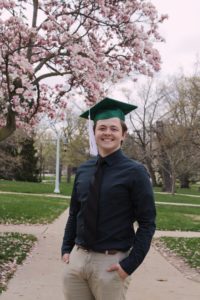 Faculty Shout-out by Dr. Robin Silbergleid:
Faculty Shout-out by Dr. Robin Silbergleid:“Marshall is a delight to have in class, a student who is always there, ready to dig into workshop or just talk shop. As a writer, Marshall takes worldbuilding to impressive heights, creating complicated family histories and detailed maps for his novel-in-progress. HIs characters and settings come to life from a deft combination of research and imagination.”
1)How would you describe your time as an English or Film Studies major at MSU?Faculty Shout-out by Dr. Steve Rachman:
“Sophie is a fine student. Her comments in class were always incisive and pertinent. She always has something interesting to say whether discussing crime fiction or medical literature (the two subjects she has studied in my classes.) She often would express things that many students were feeling but could not find the words for. Her papers also reflected this same cast of mind, revealing a nice attention to detail with an eye to the larger meanings and contexts. I know she will succeed in whatever field she enters.”
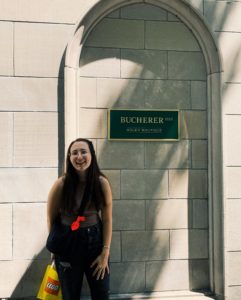 Faculty Shout-out by Dr. Steve Rachman:
Faculty Shout-out by Dr. Steve Rachman:
“Ryan is notable in many ways—an excellent writer, an avid and voracious reader, an adept in the mysteries (at least to me) of crocheting. Her kindness and intelligence are always present in her smile and her comments. She is part of a constellation of friends and fellow students in my pop culture methods class that are delightful and reflect well on MSU and the good of this place where education and friendship can come together so harmoniously.”
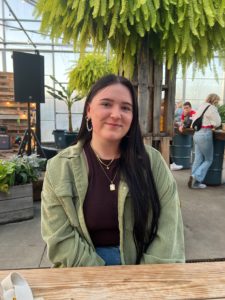 Faculty Shout-out by Dr. Robin Silbergleid:
Faculty Shout-out by Dr. Robin Silbergleid: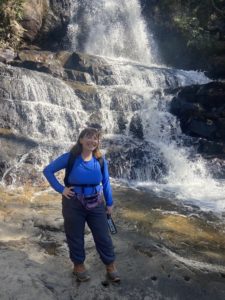 Faculty Shout-out by Prof. Cindy Hunter Morgan: “Julianna was a delight to have in class. I will remember (and always admire) how, in a ten-minute writing exercise in class, she summoned the raucous charm of Beal Street (our own in East Lansing), compressing a year’s worth of memories into a concise, enchanting, full-hearted meditation on place. I’ll also remember the pleasure of reading her creative nonfiction essay, which moved gracefully back and forth between sublimely pithy scenes at band camp during the 2017 solar eclipse and paragraphs in which she shared peculiar and sometimes profound information about the celestial event. Of course, the wit and style I admire in Julianna’s writing is all part of Julianna herself. I loved hearing her ideas all semester, and I love knowing she’s headed out into the world to share her ideas – and her wit and empathy – with lucky students.”
Faculty Shout-out by Prof. Cindy Hunter Morgan: “Julianna was a delight to have in class. I will remember (and always admire) how, in a ten-minute writing exercise in class, she summoned the raucous charm of Beal Street (our own in East Lansing), compressing a year’s worth of memories into a concise, enchanting, full-hearted meditation on place. I’ll also remember the pleasure of reading her creative nonfiction essay, which moved gracefully back and forth between sublimely pithy scenes at band camp during the 2017 solar eclipse and paragraphs in which she shared peculiar and sometimes profound information about the celestial event. Of course, the wit and style I admire in Julianna’s writing is all part of Julianna herself. I loved hearing her ideas all semester, and I love knowing she’s headed out into the world to share her ideas – and her wit and empathy – with lucky students.”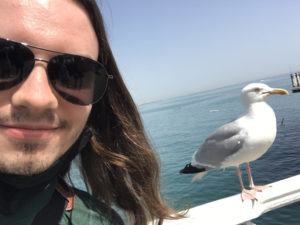 Faculty Shout-out by Prof. Pete Johnston: “Our Film in Britain and TIFF study abroad programs would not have been the same without CHARLIE! Everyone who’s met Charlie has had their day brightened by his offbeat sense of humor and friendliness. He put a lot into learning new skills for our fiction film capstone, and he always puts so much thought into his discussion about film. Terrific person to have had in classes these past 4 years!”
Faculty Shout-out by Prof. Pete Johnston: “Our Film in Britain and TIFF study abroad programs would not have been the same without CHARLIE! Everyone who’s met Charlie has had their day brightened by his offbeat sense of humor and friendliness. He put a lot into learning new skills for our fiction film capstone, and he always puts so much thought into his discussion about film. Terrific person to have had in classes these past 4 years!”
Faculty Shout-out by Dr. Justus Nieland: “It was a delight to get to know Charlie as part of the Film in Britain Program. He’s exactly the kind of person you want on a study abroad experience: curious and adventuresome, funny and kind, and super smart! A real cinephile, Charlie possesses a contagious passion for cinema, and he’s a terrific writer. I loved that he was always finding new films and events to discover in London, and he was always excited to share these discoveries with everyone on the program. He made all of our experiences richer. Charlie will be missed!”
Faculty Shout-out by Dr. Kaveh Askari: “Charlie is the kind of student one is always happy to have in a class. He is serious, he maintains a deep commitment to understanding cinema, and he follows his own intellectual path. It has been a pleasure hearing his thoughts about films after screenings and hearing about his cinematic adventures during the study abroad programs in London and Toronto.”
1)How would you describe your time as an English or Film Studies major at MSU?
Pursuing a Film Studies major with a Fiction Filmmaking minor has given me the time and resources needed to develop myself into a more confident writer and filmmaker. MSU is not frequently talked about as a place to pursue film as a craft and a career, but this is merely due to the quality of not only the curriculum and resources, but also the personnel, going unrecognized. I’ve been able to establish a personal foundation for pursuing a career in the film industry that is sure to last a lifetime.
2)Which classes, instructors, or experiences particularly stand out for you and why? How did they prepare you for the next phase of your life?
There are too many professors from my far-too-short years at MSU to thank in a concise paragraph, so this paragraph will not be concise. Joshua Yumibe helped expose me to the fascinating origins of the film medium and the philosophy, and it was his personal endorsement of the university’s film program that led to me choosing MSU in the first place. Pete Johnston has been an integral mentor and guide as I continue to explore the technical sides of filmmaking, and he and Justus Nieland managed to make our shared experiences abroad in London and Toronto both thrilling and enriching. Ellen McCallum, Kuhu Tanvir, and Kaveh Askari’s enthusiasm for exploring film as a reflection of a myriad of critical historical movements and societal visions helped me to appreciate cinema in a way that I had yet to fully register until recent years. And Rick Blackwood’s intimate and granular breakdown of the subtleties of form and style in developing scripts to be embraced by the film industry has given me the opportunity to finalize the type of writer that I want to be.
3)What advice would you give future English or Film Studies majors, based on your experiences in the department?
Get your hands on a camera, learn all the important lingo and basic techniques, and get going on honing your craft as fast as possible. You have the privilege of spending your time on one of the most photogenic and picturesque college campuses in the world; you’d best try to capture it in frame as you work to break into the filmmaking world. Be sure to make ample use of the resources available to you at places like the Film Lab in Wells, and try to connect with the students and staff of the CommArts center as well. You have the opportunity to make use of professional-grade equipment, so get out there and start shooting.
4)What coursework-related projects were/are you working on this year, and what interests or excites you about them?
I have been hard at work on finalizing an undergraduate thesis in the form of a feature-length screenplay with the help of Professor Blackwood. I have also had the honor of working alongside many talented individuals in my capstone course to produce a short film called Promises, Promises, which promises to showcase the incredible talent and potential of many of my contemporaries in the program.
5)What are your hopes and aspirations, post-graduation?
My hope is to pursue an MFA in screenwriting after taking a short gap year to decompress after such an eventful undergraduate tenure. I am already looking at multiple schools in the Toronto area, and also a few domestic schools that include UC-Berkeley and NYU Tisch.
6)If you’re interested in doing so, please reflect a bit on the experience of being a graduating senior during the ongoing pandemic and a tragic spring semester on campus. What resources have been most useful to you in navigating this unprecedented situation?
We had to deal with a pandemic that killed millions, multiple rumblings of global war, threats to national and social stability, and bloodshed right here on our college grounds. And we’re still here. The endurance that these students have shown is enough to last a lifetime. But we’re going to press on, and we’re going to start fixing things. I’m confident in that.
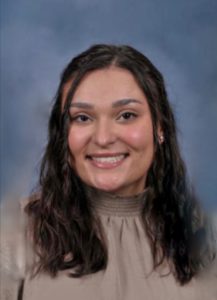 Faculty Shout-out by Dr. Robin Silbergleid:
Faculty Shout-out by Dr. Robin Silbergleid:“I have had the pleasure of working with Katie in the context of three creative writing courses, including Advanced Poetry (Spring 2022) and her senior capstone in creative writing (Spring 2023). As a poet, she is willing to get vulnerable and take risks, exploring the complexity of biracial experience and family dynamics; as a fiction writer, she lets her imagination lead her to develop complex plots involving romance, murder, and more. As a storyteller, she’s kept her classmates on the edge of their seats begging for the next chapter.”
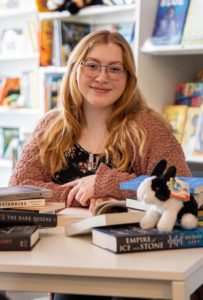 Faculty Shout-out by Dr. Robin Silbergleid: “It has been a pleasure to work with Annabelle Italia in two classes. Her poetry centers on food and family, including the conflict that arises when one doesn’t eat what is culturally expected; from an ode to sugar in its myriad forms to the pasta cooked by a significant other, her descriptions are luscious, her metaphors evocative.”
Faculty Shout-out by Dr. Robin Silbergleid: “It has been a pleasure to work with Annabelle Italia in two classes. Her poetry centers on food and family, including the conflict that arises when one doesn’t eat what is culturally expected; from an ode to sugar in its myriad forms to the pasta cooked by a significant other, her descriptions are luscious, her metaphors evocative.”
1)How would you describe your time as an English or Film Studies major at MSU?
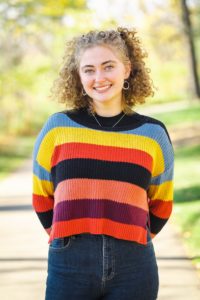 Faculty Shout-out by Professor Jeff Wray: “Maggie came to MSU on a mission. She is involved – a writer, an actor, a filmmaker, a leader. I often ask myself in the film courses she has been in with me, ‘Is there nothing that Maggie cannot do?’ What a pleasure and honor to have had her as a student.”
Faculty Shout-out by Professor Jeff Wray: “Maggie came to MSU on a mission. She is involved – a writer, an actor, a filmmaker, a leader. I often ask myself in the film courses she has been in with me, ‘Is there nothing that Maggie cannot do?’ What a pleasure and honor to have had her as a student.” 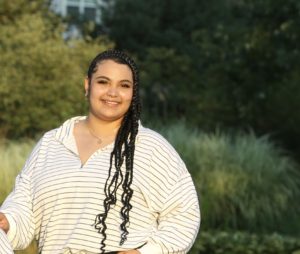 Faculty Shout-out by Professor Divya Victor: “I think a lot about the function of the lungs when Kalynna speaks in class. She takes what circulates in the discourse and reframes, elevates, and clarifies the ideas offered by peers to breath new life into what is being co-composed. Her work is atmospheric, organic, clarifying. She is fearless in a way that only the most tender-hearted poets are— ready to interpret a word or an image at its farthest edge, confident in her ability to swim back to shore from that risked place. Her warm, garrulous humor keeps her diligent, determined, and serious practice good company. I will miss the way everyone’s attention shifts, slows and becomes brighter when she speaks in class.”
Faculty Shout-out by Professor Divya Victor: “I think a lot about the function of the lungs when Kalynna speaks in class. She takes what circulates in the discourse and reframes, elevates, and clarifies the ideas offered by peers to breath new life into what is being co-composed. Her work is atmospheric, organic, clarifying. She is fearless in a way that only the most tender-hearted poets are— ready to interpret a word or an image at its farthest edge, confident in her ability to swim back to shore from that risked place. Her warm, garrulous humor keeps her diligent, determined, and serious practice good company. I will miss the way everyone’s attention shifts, slows and becomes brighter when she speaks in class.”
Faculty Shout-out by Professor Jeff Wray: “Kalynna is such a talented creative. She has been a real glue person, a cultural builder in my classes. It has been such a pleasure to teach and learn from her.”
Faculty Shout-out by Professor Josh Lam: “Kalynna is a powerful presence in the classroom: always thoughtful, willing to engage, and to bring texts and media into conversation with real-life experience and contemporary political discourse. She is also hilarious—a constant source of levity and wit that warms any classroom she is part of, creating community in even the largest of courses.”
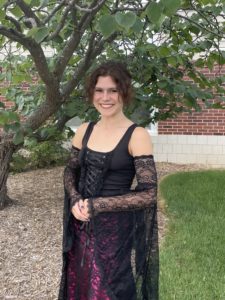 Faculty Shout-out from Dr. Zarena Aslami:
Faculty Shout-out from Dr. Zarena Aslami:
“Katie Burkhardt brought a sharp and insightful perspective to the classroom and to her senior honors thesis. In class, her comments and questions enlivened the discussion, adding intellectual spark, while her papers were sites of original inquiry that showed precise and careful literary interpretations. Katie’s thesis was a fun yet rigorous romp through several literary texts that featured reanimated bodies, including Mary Shelley’s Frankenstein and H. P. Lovecraft’s “Herbert West—Reanimator.” In her thoughtful handling of these texts, she considered historical factors of race, class, and gender, asking how each literary instance of reanimation connected with specific contemporary social and legal circumstances.”
1)How would you describe your time as an English or Film Studies major at MSU?
It’s been a turbulent time, for sure. I’ve switched my focus from literary studies to secondary education back to literary studies, so it’s hard to describe my time as an English major in terms of one prevailing theme or experience. But one thing I can say is that I’ve always found a sense of community in my English classes, regardless of what I was going through and what was happening around me. My English major has truly changed the way I view the world and interact with others, and I’m sad to see it end since the community has been such an anchor for me.
2)Which classes, instructors, or experiences particularly stand out for you and why? How did they prepare you for the next phase of your life?
It’s difficult to pick just one, but I’ve definitely appreciated my time learning from Dr. Zarena Aslami and doing my honors thesis with her. She helped me learn how to dig deep into texts and scholarly sources to craft my own arguments while also examining the roots of many literary texts in structural inequalities. Even though I’m not becoming a teacher anymore, English 302 and English 308 both gave me a strong understanding of how language and literature affect people, and how to be as inclusive as possible—not to mention the advantages of learning about different types of Englishes. Finally, I’ve been fortunate enough to take a creative writing class with Dr. Gordon Henry during his last semester teaching here, and I feel that he and the class have helped me grow so much both in my writing and in my identity as a writer, as well as offering many important life lessons and a general sense of support and community. These all prepared me in different ways for the next phase of my life, but I feel like a more well-rounded person who is ready to use what I’ve learned to help others and enact positive change in the world.
3)What advice would you give future English or Film Studies majors, based on your experiences in the department?
Don’t be afraid to branch out and explore classes in other departments! It’s important to diversify your skills and knowledge, and English provides an amazing framework to better understand other disciplines. Also, make sure to take English classes that are outside of your comfort zone, you’ll be surprised at how much you’ll learn and grow from it!
4)What coursework-related projects were/are you working on this year, and what interests or excites you about them?
This year, I got to work with Dr. Zarena Aslami on my honors thesis, and I absolutely loved doing that! I got to write about the ways that three horror texts portrayed the human body and the sociocultural factors that influenced these portrayals. I’ve always been interested in horror and the “paranormal” so getting to research and write about it for an entire semester AND get credit for it was amazing. Getting to work with Dr. Aslami was also incredibly beneficial to learning about the aspects of power through colonialism, racism, sexism, etc. being portrayed in the horror genre.
5)What are your hopes and aspirations, post-graduation?
My goal is to earn a PhD in Sociology. English as a discipline is my first love, but I’ve found that my background in English allows me to have a deeper understanding of sociological issues and vice versa. My time as a secondary education focus also inspired me to eventually become a sociology professor because of what I learned about inclusive teaching practices. Those are my dreams, and although the future is uncertain, I am adamant in my goal of helping teach or mentor future generations while remaining a lifelong learner.
6)If you’re interested in doing so, please reflect a bit on the experience of being a graduating senior during the ongoing pandemic and a tragic spring semester on campus. What resources have been most useful to you in navigating this unprecedented situation?
It has been an exhausting semester, to say the least. Community has been the biggest thing that has helped me through this year. In the English department, I appreciate Dr. Gordon Henry for making our classroom a space where we could come together as writers and share a space of processing and healing. Outside of our department, I’ve leaned heavily on my friends in MSU’s Paranormal Society, the people I was with during the actual event, and have appreciated my sociology professor Dr. Jennifer Carrera for also fostering a space of healing.
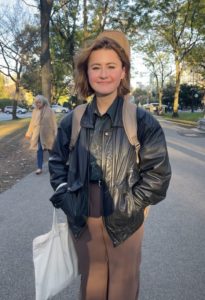 Faculty Shout-out by Dr. Steve Rachman: “Liv is a subtle reader with a keen eye for interpreting texts. With her passion for art and her background in physiology she makes an ideal student for the study of literature and medicine (the course she took with me.) I always looked forward to her fresh slants on whatever we were reading on a given week. She has written with great insight about the pandemic and the literature produced during it and I know she will find a way to balance her varied interests. She is a fine student, and I cannot wait to hear of her accomplishments.”
Faculty Shout-out by Dr. Steve Rachman: “Liv is a subtle reader with a keen eye for interpreting texts. With her passion for art and her background in physiology she makes an ideal student for the study of literature and medicine (the course she took with me.) I always looked forward to her fresh slants on whatever we were reading on a given week. She has written with great insight about the pandemic and the literature produced during it and I know she will find a way to balance her varied interests. She is a fine student, and I cannot wait to hear of her accomplishments.”
1)How would you describe your time as an English or Film Studies major at MSU?
My time as an English major at MSU hasn’t been linear, but I’m beyond grateful for my experience. As a freshman, I went into college thinking a STEM focused career path was the smartest, most stable decision. I declared a Physiology major and truly enjoyed advancing my scientific knowledge; however, I couldn’t shake the feeling that I abandoned something I considered part of my identity – my love for reading and writing. I continued college as a Physiology major but took any English course I could cram into my schedule. After graduating with a Physiology degree in May 2022, I took a semester off of school before coming back to officially declare and complete an English degree. Coming into this semester older and more confident has allowed me to maximize my English studies. This degree has refined my writing skills, broadened my understanding of various literary topics and theories, and allowed me to cultivate meaningful relationships with professors and peers.
2)Which classes, instructors, or experiences particularly stand out for you and why? How did they prepare you for the next phase of your life?
There were so many beneficial courses I’ve taken throughout my time at MSU. Two classes I found particularly influential were ENG 280 (Intro to Literary Theories) with Professor Lam and ENG 473A (Literature and Medicine) with Professor Rachman. Professor Lam did an excellent job laying the ground work for my literary studies. He assigned engaging, diverse readings that effectively sparked new ideas and class discourse. Most of the learning was done by discussing and interpreting various texts with peers that pertained to both the literary and ‘real’ world. Outside of his dynamic teaching style, Professor Lam is extremely intelligent and kind hearted. He truly cares about his students well-being and humbly guides their understanding of various subjects. As someone with dual interests in English and Science, I didn’t think those subjects would overlap much in my academic career. I was glad this notion was disproved after taking ENG473A. This course explored the intersection between literature and medicine, dissecting every angle of the medical world from plagues and patient/doctor experiences to major ethical questions and concerns. Through his thought provoking questions, Professor Rachman was able to stimulate meaningful, interesting discussion that probed a wide array of topics and opinions. Much like Professor Lam, Professor Rachman really cares about students. Personally, he was sincerely invested in getting to know me in order to provide the best education as well as advice for the future. After talking with him, I’m convinced Professor Rachman himself is an encyclopedia considering the amount of information he knows. Overall, expanding my knowledge, improving my writing and interpersonal skills, and gaining a deeper understanding of the world and the people in it are a few ways these classes/professors have prepared me for the next phase in my life.
3)What advice would you give future English or Film Studies majors, based on your experiences in the department?
One useful piece of advice for future English/Film Studies majors would be to take the time to research the classes and professors you sign up for. Instead of blindly enrolling in any course that fits your degree requirements, make sure to look for topics that peak your interest. This also means being open to topics you’re unfamiliar with! Furthermore, choose classes that are conducive to your learning style. Personally, I do best in courses with heavy loads of reading and a focus on class discussion. Look around online and ask peers how courses and professors operate. Also, take advantage of the resources you have. Talking to both professors and peers can be useful in fostering knowledge and opportunities. Remember that your time at university is limited, so make the most of it – even if you’re scared!
4)What coursework-related projects were/are you working on this year, and what interests or excites you about them?
ENG473A is a capstone course that ends the year with a creative project. My project is focused on an art piece dedicated to Henrietta Lacks, the woman whose cells produced the first immortalized cell line. This project is exciting because it encapsulates the consonance between literature and medicine; it’s pertinent to know both the science and personal story behind Henrietta’s cells.
5)What are your hopes and aspirations, post-graduation?
My goal after graduation is to get my first ‘big girl job.’ I hope to do some sort of writing or editing for a creative journal or scientific network. Also, I’m considering going to graduate school at some point in the future.
6)If you’re interested in doing so, please reflect a bit on the experience of being a graduating senior during the ongoing pandemic and a tragic spring semester on campus. What resources have been most useful to you in navigating this unprecedented situation?
School has not come without its difficulties. Following the emergence of COVID-19, learning was completely disrupted as classes moved online and people were displaced across the globe. Shifting to a virtual learning environment was difficult, and I found myself feeling lonely and discouraged frequently. After coming back to campus in fall 2021, it was strange to see peers everyday without being able to identify their face due to masking. The unavoidable feeling of disconnection was still apparent. I was beyond ecstatic after learning my last school year would be normal. This feeling faded after the horrific tragedy that occurred on February 13th. Now a days it seems impossible to achieve a sustained state of ‘normalcy,’ yet I can’t help but feel grateful for the community that was strengthened by these experiences. People are your greatest resource. Whether it comes to learning, protesting, or simply crying, the only way to get through these events is together.
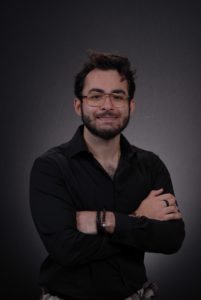 Faculty Shout-out by Professor Pete Johnston: “Josh is a wonderfully thoughtful student I’m so pleased to have worked with on the Film in Britain program. He’s got a great spirit and a dedication to exploring film, is very insightful into film analysis and discussion, and he made such a great addition to that cohort of students! I have a feeling he’s going to go on to a bright and brilliant future.”
Faculty Shout-out by Professor Pete Johnston: “Josh is a wonderfully thoughtful student I’m so pleased to have worked with on the Film in Britain program. He’s got a great spirit and a dedication to exploring film, is very insightful into film analysis and discussion, and he made such a great addition to that cohort of students! I have a feeling he’s going to go on to a bright and brilliant future.”
Faculty Shout-out by Dr. Justus Nieland: “I am so impressed by Josh, as a student and a person. He was an essential part of a wonderful cohort of students on the Film in Britain program. In addition to being a super smart, inventive, and surprising writer, he is the kind of thinker who can powerfully reorient a discussion with an incisive comment or gently probing question. I was grateful for his kind and compassionate spirit during our time in London. I’ve been grateful to witness more of his resilience as a person and his deep intelligence and maturity as a student and writer this semester. Watch out, world! Josh is going to continue to impress us in this next phase of his life.”
Faculty Shout-out by Dr. Ellen McCallum: “In two classes with me, Josh Kish proved himself to be an amazing student and person, exemplifying astute critical reflection on the material, genial collaboration with his colleagues, and a maturity in meeting challenges. Early in the semester, Josh reached out both to discuss how intimidating the readings were and what he needed to do to be on track with the course. We talked about strategies for approaching the reading and gaining a handle on the material, and he showed himself to be a quick study. His increasing confidence in moving forward in the course was notable, and it was a privilege to witness him come into his own in class, regularly providing wise insights in our discussion. He excelled at taking feedback from an assignment to improve on the next one.
He was accepted to the Cannes Film festival internship last summer, and then from Cannes he went on to the Film in Britain program. He was doing super well in FLM380 in the fall when tragedy struck his family. His resilience and tenacity in facing that awful challenge and hanging in here to finish up this term is remarkable and attests to the richness of his character. Josh’s resilience, determination, wisdom, and thoughtfulness will stand him in good stead beyond MSU.”
1)How would you describe your time as an English or Film Studies major at MSU?
My time as a Film Studies major at MSU is best captured by the word “illuminating.” My time at MSU, in general, has led to self-realization and growth in numerous ways, but, specifically, the experiences I’ve gathered through the Film Studies department have allowed me to find deeper understandings of me and what I want to do with my life. I started off at MSU as a STEM major – being a first-generation college student often comes with the pressure to pursue one of those stereotypically successful career paths. It took a lot in me to switch courses, but after taking that FLM200 class during the spring semester of my freshman year, I realized that I was never going to be happy in that STEM career. With each subsequent Film Studies class, I have fallen deeper in love with movies and have come to understand using this opportunity of higher-education to pursue something I love IS doing right by my ancestors. That’s why I’ve chosen that word – my time as a Film Studies major at MSU has been an incredibly illuminating one.
2)Which classes, instructors, or experiences particularly stand out for you and why? How did they prepare you for the next phase of your life?
The time I spent on the Film in Britain study abroad program has proven unforgettable. Those five weeks offered me the chance to explore London and surrounding cities while gaining a deeper appreciation for film and a new understanding of a totally different film culture than the one I am used to. Although my fellow students started out as practical strangers, roaming London with them led me to find some of my closest friends and confidants. Pete Johnston and Justus Nieland, the two faculty joining us on this trip, used their own passions for film and love of London to enhance the experience even more. I’d say, however, the greatest insight this experience left me with is this newfound confidence in my ability to really thrive in a more-independent environment. I was full of anxiety and doubt leading up to the trip, but as my nerves calmed, I found myself just truly living in every sense of that word. I formed deep bonds with other students in the group and gained connections with people from all over the globe – Texas to Oxford. Therefore, no matter where I end up next, I can always remember that I am capable of just truly living.
3)What advice would you give future English or Film Studies majors, based on your experiences in the department?
By far, the best piece of advice I can give other Film Studies students would be to get to know your professors. Our department has a very strong group of faculty who want to see their students succeed. I have been lucky to form pretty good connections with a handful of professors, and those connections all stemmed from speaking up in class and attending office hours. They’ve led me to different paths with unforgettable experiences!
4)What coursework-related projects were/are you working on this year, and what interests or excites you about them?
Over the summer, I completed my capstone course under Pete Johnston with two other students while studying abroad on the Film in Britain program. We got the chance to work with the British comedian Ben Rufus Green to film one of his comedy sketches. This was an incredible experience which gave me the chance to work on a set for the first time. It is something I am quite proud of and a memory I’ll hold onto forever.
5)What are your hopes and aspirations, post-graduation?
In about a year from now, I plan to move to Los Angeles with a group of friends to pursue filmmaking. I think my background with dual majors in Film Studies and Advertising Management alongside a minor in Chicano/Latino Studies offers me a unique set of skills when it comes to filmmaking. Specifically, I’d like to write and direct – Film Studies has helped me develop my writing a lot, so this is what I plan to pursue, but I also plan to be open to whatever may come my way. Being open and flexible has led me to some really profound experiences, so ultimately, I don’t want to be too firm in any plan ahead of me. During the year between then and now, however, I plan to spend it at home. After losing my little sister in October and being unable to take time off from school, I’d really like to spend the next year unpacking everything. I want to reflect on the last four years – I want to reflect my little sister and figure out how I can move forward while honoring her. I hope to also work on some personal projects and travel more. But, ultimately, I’d like to spend the next year just truly finding myself and determining what I want out of this life moving forward.
6)If you’re interested in doing so, please reflect a bit on the experience of being a graduating senior during the ongoing pandemic and a tragic spring semester on campus. What resources have been most useful to you in navigating this unprecedented situation?
School is hard when “unprecedented times” hovers over your head. While I cannot speak for any other experiences, I know that my fellow students and I have been faced with very high levels of difficulty throughout these last four years. A global pandemic is certainly something we were not prepared for, and learning virtually was hard to get used to. As for me personally, this schoolyear has truly been the worst of my life. Losing my little sister in October was a tragedy, and I’ve spent every second since then trying to live this life for her. And after February 13th, I realized that I am no longer just trying to make Amanda Grace proud. Life is hard, and not everyone gets as far as they hoped, and I’m afraid that is the sad truth. But, another truth is there are countless people that will offer their support in any way they can. I have been very lucky to be surrounded by friends, family, and faculty who all care and have supported me through the loss of my sister and our fellow Spartans Brian, Arielle, and Alexandria. Being open with my professors and letting them know what I am going through has been by far the greatest resource to my disposal, and I implore others to do the same as they find themselves. struggling.
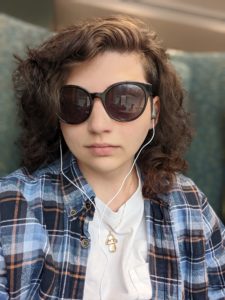 Faculty Shout-out by Dr. Robin Silbergleid: “It’s been a pleasure getting to know and work with Ren Newman this semester on their senior capstone project. From developing the world’s mythology to scripting family drama and fight scenes with magical creatures, Ren’s fiction showcases the heights of their imagination even as the narrative tackles real-world issues including generational trauma and mental health.
Faculty Shout-out by Dr. Robin Silbergleid: “It’s been a pleasure getting to know and work with Ren Newman this semester on their senior capstone project. From developing the world’s mythology to scripting family drama and fight scenes with magical creatures, Ren’s fiction showcases the heights of their imagination even as the narrative tackles real-world issues including generational trauma and mental health. 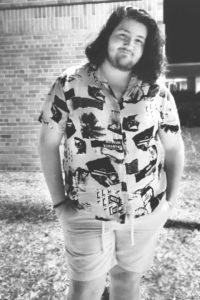 Faculty Shout-out by Professor Jeff Wray: “In the two years of the fiction film capstone, Brien has been a leader from the start. He steps up, takes on and organizes any and everything as needed. Brien is the person who makes the various parts of filmmaking work as a whole.”
Faculty Shout-out by Professor Jeff Wray: “In the two years of the fiction film capstone, Brien has been a leader from the start. He steps up, takes on and organizes any and everything as needed. Brien is the person who makes the various parts of filmmaking work as a whole.” 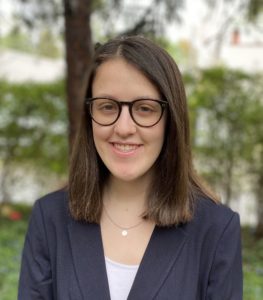 Faculty Shout-out by Professor Steve Rachman: “I have never had the opportunity to meet Sam in person because she took ENG 280 in the Fall of 2020, during the chaos of the election and the terror of COVID-19. She was the kind of student that gave me hope for the future, working so patiently and hard from her room online. I recall her asking via email if it was okay to use materials from a podcast that supplemented the assigned readings. The request showed someone already digging into our studies and finding another vista, a further range to pursue. Her excellent work reflected this diligence. She was one of those great students who managed to transcend Zoom and I wish her all the best.”
Faculty Shout-out by Professor Steve Rachman: “I have never had the opportunity to meet Sam in person because she took ENG 280 in the Fall of 2020, during the chaos of the election and the terror of COVID-19. She was the kind of student that gave me hope for the future, working so patiently and hard from her room online. I recall her asking via email if it was okay to use materials from a podcast that supplemented the assigned readings. The request showed someone already digging into our studies and finding another vista, a further range to pursue. Her excellent work reflected this diligence. She was one of those great students who managed to transcend Zoom and I wish her all the best.”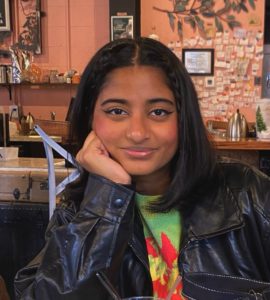 Faculty Shout-out by Professor Pete Johnson: “Nithya has been a dedicated member of the film lab assistant team for a few years now, and has grown so much in so many areas of film analysis, writing, and making. She has put a lot into her screenwriting and become such a fantastic addition to our film community here. We’re going to miss her and NYU is so lucky to have her coming their way!’
Faculty Shout-out by Professor Pete Johnson: “Nithya has been a dedicated member of the film lab assistant team for a few years now, and has grown so much in so many areas of film analysis, writing, and making. She has put a lot into her screenwriting and become such a fantastic addition to our film community here. We’re going to miss her and NYU is so lucky to have her coming their way!’
Faculty Shout-out by Dr. Rick Blackwood: “Nithya was my student at MSU in FLM 434, Advanced Screenwriting, and FLM 480, Sex & Violence in Cinema. Nithya is one of the best students I ever taught. I repeat, best. She played a critical role intellectually in both courses. She’s the thinker. Nithya loves film, but she loves it with both heart and head. She doesn’t flinch. She’s good in discussions. She handles analytically filmmakers as diverse as Milius and Scorsese. She’s a good comrade in arms. You can talk straight to her. Nithya believes in the highest values, yet she doesn’t fear moral complexity.
Her creative and analytic work has been articulate and succinct. Her script, I’ll Meet You in the Rose Garden, is one of the best student scripts I’ve ever read. It reads with flashes and tropes of real poetry, with both queer romance and a disciplined, clear-headed creativity.”